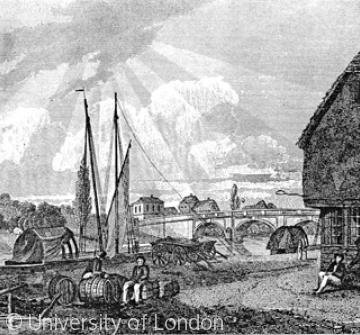Henley's Bargemen

Image: The waterfront south of New Street around 1813, the former Anchor pub in the foreground. Statements by Henley people in the 1780s paint a vivid picture of the bustling activity along this stretch. By the end of the 17th century Henley's bargemen seem to have comprised the largest single occupational group, though their wealth and status varied considerably. A few were part-owners of barges, and presumably worked as contractors for local wood or grain merchants. Others had no equipment, and were perhaps hired barge-hands rather than barge-masters. The barges themselves were most likely built in London, where several Henley bargemen apprenticed their sons to shipwrights in the late 17th and early 18th century. During the 18th century, as vessels became larger, barging seems (like many industries in the period) to have become more capital-intensive. By mid century barges capable of carrying up to 200 tons were becoming commonplace, with the very largest bargemasters running at least 1 or 2 vessels and sometimes 3 or 4. Such a venture required substantial capital and could be extremely lucrative. John Burton, a pamphleteer strongly opposed to the huge increase in barge size, complained that 'a few overgrown barges ... engross the whole business of the country adjacent', allowing masters to inflate prices. The bargemaster ‘considers himself rather as a Merchant than a Carrier ... refusing to carry goods but on his own terms'. How many bargemasters operated from Henley at any one time is difficult to establish. In the late 18th century it was probably never more than half a dozen or so, with several families (such as the Ushers, Smiths and Jacksons) continuing for several generations. Alongside them were bargemasters from neighbouring towns, who also operated through Henley. In some instances women continued the family business after their husband's death. Sarah Jackson was described as a bargemaster and publican in 1774, though at the time she was in Oxford Castle for debt. From the 1830s and 1840s the river trade succumbed to the railway, and though river workers were recorded in Henley throughout the 19th century they were increasingly involved with recreational boating rather than with commercial barging. The last barge operators in Henley were Robert Webb & Sons, who ran a weekly barge to London into the 1880s. Read more about Henley's bargemen and Western barges, or about the town's wharfs, the Thames river trade and locks and canals. Or investigate Henley's bargemen through their wills. .
Content generated during research for the paperback book 'Henley-on-Thames: Town, Trade and River' (ISBN 13 : 978-1-86077-554-3) for the England's Past for Everyone series


